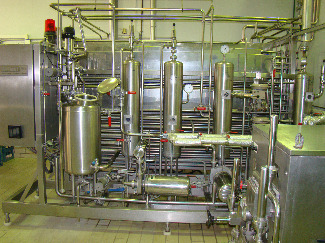First food technology research and transfer centre in Africa

UAB will assess Universidade José Eduardo dos Santos on scientific and technical aspects of the centre, specialised training will be offered to Angolan researchers, and support will be given to increase knowledge transfer. The centre also will be used by trainee researchers from both universities, as well as from other Angolan and Spanish universities.
The facility will be located between the university's Faculty of Veterinary Medicine and the Faculty of Agricultural Sciences in Huambo, the second largest city of the country. It will occupy an area of 1600 square metres and activities will focus mainly on research into transformation and conservation processes of dairy, vegetable and meat products to prolong their lifetime and guarantee their nutritional properties and sanitary quality.
It also will have a microbiology and food chemistry laboratory and a pilot plant with small-scale manufacturing facilities, such as areas for pasteurisation and homogenisation, cheese and fermented milk products, maturing, refrigeration and freezing chambers, autoclave sterilisation for vegetables, packaging and sealing, and areas for meat products and vegetable milk products.
A residence hall will be built next to the plant, measuring 385 square metres and with a total of 15 rooms for teaching and research staff working or studying at the centre.
Work on both buildings will commence soon and will be ready to function at the end of 2011.
The total cost of the project is 1,625,000 euros. AECID will invest 1,510,000 euros, UAB will invest 50,000 euros (through a special grant from the UAB Solidarity Fund) and several Angola institutions will provide the remaining 65,000 euros.
Machinery and laboratory equipment, estimated at 1,375,000 euros, will be donated by different firms and associations belonging to the sector.
One of the first research projects to be carried out at the new centre will be the design of the country’s food map and nutritional table in order to categorise food and standardise manufacturing and production throughout Angola. Secondly, a study will be carried out on omavele, milk fermented inside gourds. According to previous studies, populations consuming this milk have a longer life expectancy; this new study aims to characterise omavele and describe the bacteria involved in fermenting the milk.
CERPTA will also offer assessment on social integration projects for ex-guerrilla members, such as Aldeia Nova, located near Huambo, where they work in dairy and meat product plants and are given housing, farming land and animals.
The collaboration between universities will give way to an interuniversity master's programme in Technology and Production. The programme will last two years and will be given by UAB and CERPTA researchers in the areas of Food Technology and Production. Lectures will take place at UAB Faculty of Veterinary Medicine and at the Faculty of Agricultural Sciences in Huambo.
The new facilities will help Universidade José Eduardo dos Santos standardise and consolidate its academic and research activities at the Faculties of Veterinary Medicine and of Agricultural Sciences, both of which were heavily affected by the country's armed conflict. The university is the only institution in Angola to train professionals in agriculture and was closed during eleven years until its reopening in 2003.
The new research centre and synergies established between the two universities will provide the adequate conditions for the training of professionals specialised in animal health and production in a country with high agricultural potential and with a population largely dedicated to farming and livestock rearing.
The project has the support of the Development Cooperation Area of the UAB Solidarity Foundation (FAS). FAS is responsible for the UAB Solidarity Fund and offers technical support and assessment in project management and serves as liaison between institutions.

